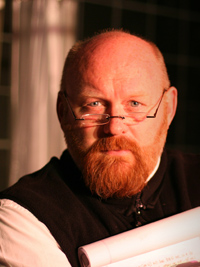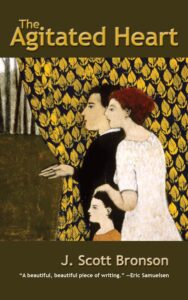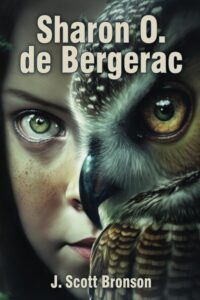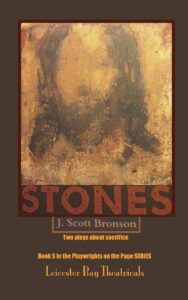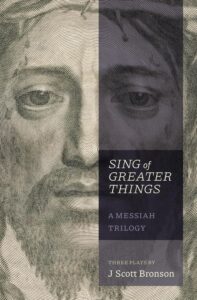 [J. Scott Bronson introduces his newly published collection of plays, Sing of Greater Things: A Messiah Trilogy (BCC Press).]
[J. Scott Bronson introduces his newly published collection of plays, Sing of Greater Things: A Messiah Trilogy (BCC Press).]
“Wonderment pours from our faces
Thunder is born in our eyes.” – Loggins & Messina
I wonder about things – many things.
I always have.
Why is this bumblebee shiny and black? And this one fuzzy and striped? Why are Mom’s chocolate chip cookies better than everyone else’s? How does a sea anemone glue pieces of shell to its back?
How could Lucifer think he was smarter than God? How could he actually believe his plan would win the day?
That one came to me while I was sitting on a bench in the junior Sunday School room in the Pacific Beach Ward in San Diego when I was eight or nine years old mumblety-some years ago. We were talking about the plan of salvation during opening exercises. When we got to the part where Lucifer presents his evil plan, I remember thinking, “How stupid does this guy have to be in order to believe that he could beat God?” My youthful brain had difficulty wrestling with the disconnect that Lucifer was obviously, totally, out of his stinking mind even though he was called the Son of the Morning (or something like that), which apparently, was some fancy-nancy title.
I wondered about this–off and on–for a long time. Right up until I had a late night conversation in Kanosh, Utah with my friend Brian Kershisnik who offered some intriguing thoughts about a particular sibling rivalry that ultimately resulted in the play, Brothers. Which comprises four conversations between Jehovah and Lucifer: War in Heaven; Temptations in the Wilderness; Discouragement in the Garden; Terror on the Edge of Darkness.
And therein I found–to my satisfaction–a plausible explanation for my long-considered wonderment.
Also in my youth, I had the (probably) very impertinent thought that it was ridiculously unfair that Jesus did not get into trouble when he ran off to chat it up with the priests in the temple without telling his parents with a totally lame excuse like, he was about his father’s business. According to the rules I lived by at the time, before he even thought about doing something like that he had to clear it with his Earthly folks. It’s only the polite thing to do, right? Of course, right. I wondered why it seemed at least certain basic rules of familial courtesy did not apply to him.
As you might imagine, I wondered and pondered on this for quite some time. Right up through and in conjunction with my wondering and pondering on the various scriptures that talk about how Jesus did not receive a fulness at first; how he “increased in wisdom and stature, and in favor with God and man” line upon line, precept upon precept. This lead me to suppose that it was entirely possible that his mortal parents had indeed established rules and guidelines for the family and that they very likely held Jesus to their standards. We just didn’t get that part of the story. So, of course–me being me–I had to wonder how that story would go.
In part two of Stones, a one-act titled, Tombs, I tell my version of that story.
For some reason, quite awhile back, during one of my read throughs of the New Testament, my wonderment was piqued by the fact that Mary and Elizabeth–both carrying babies conceived under special circumstances–lived together in Elizabeth’s house for three months. I had to wonder–I mean had to wonder–what it would have been like to be a fly on the walls in that house at that time.
I sat on that one for a good little while.
Something I felt I had to consider: as an old white dude, did I even have the right to touch that story? Of course, in artistic matters, do “rights” even really enter the equation? But, still, maybe it would be deemed culturally insensitive of me, “Completely unacceptable, sir.” For awhile I thought, “Maybe I should find a person of the womanly persuasion to collaborate with, or just hand it off to them.” But I really wanted to explore it myself.
When COVID came upon us and I was looking for something creative to throw my time at, the thought hit me one day, “Dude, just do it. Don’t be afraid of what anyone thinks is “acceptable” for you to do. You get to decide that and no one else. Just do it and see what happens.”
Blesséd Wombs happened.
It is part two of another pair of one-act plays, this set under the title: Mothers of Zion. And I like the way it turned out. And, as always, your mileage may vary.
Building a play, for me, is like going on a journey. And each of the journeys in this book, for me, were very rewarding. And not just in the journeys themselves, but in the destinations we attained.
In the Loggins & Messina song, Fever Dream, Kenny Loggins sings that when wonderment pours from our faces, thunder is born in our eyes. In other words, maybe, when we journey through our own hearts and minds, great insights can burst upon us, and if we keep our eyes open, we can see–maybe more clearly, or more inclusively–than we did before the wonderment came upon us.

